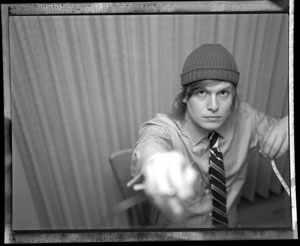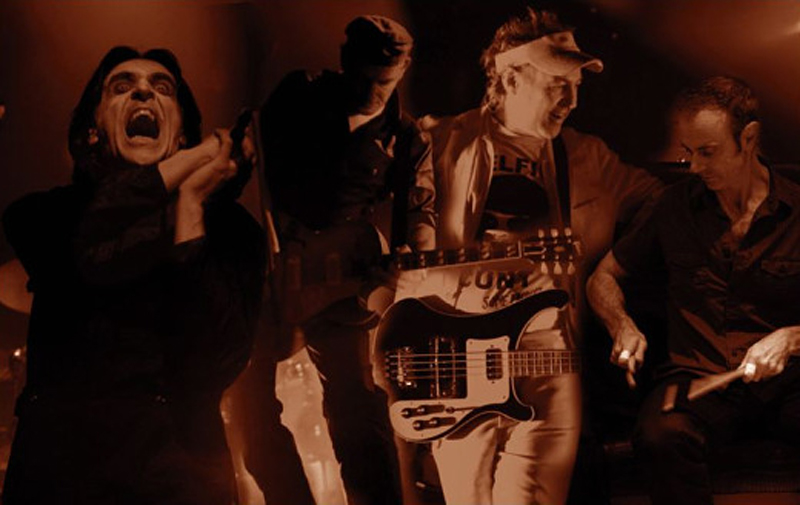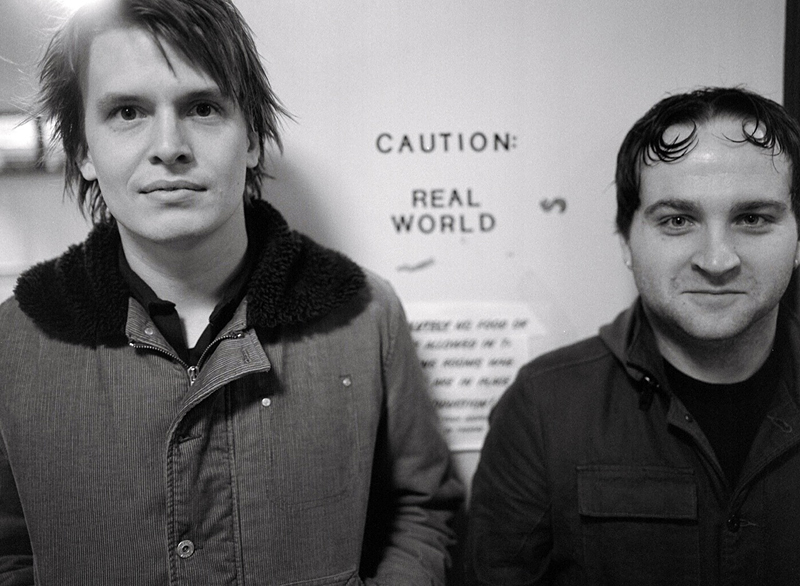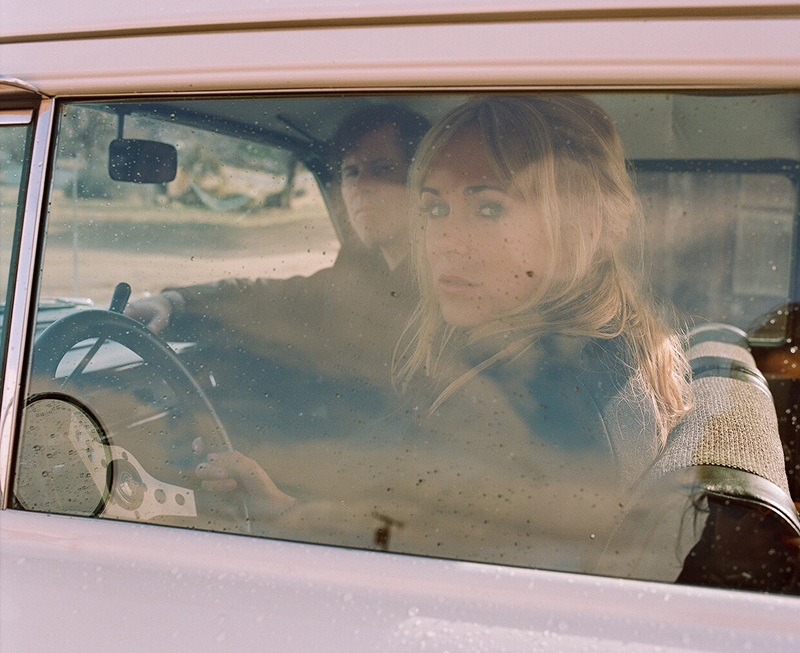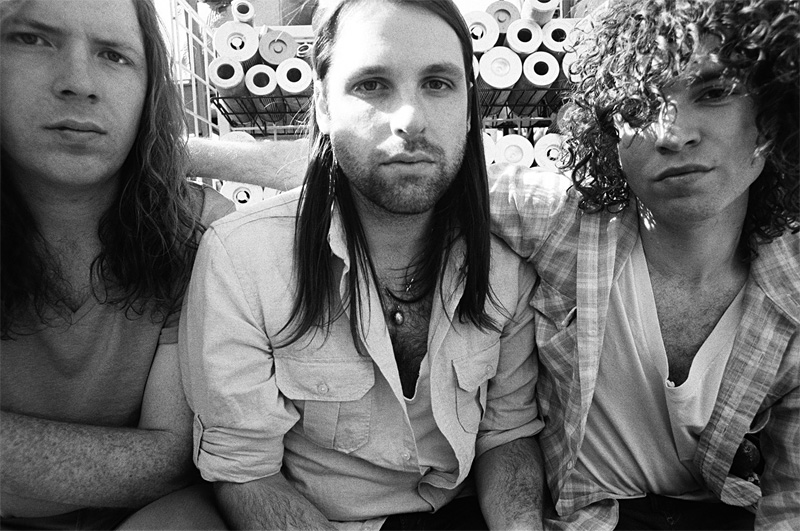I caught up with Death Cab for Cutie guitarist and producer Chris Walla the other day while he was in New York City. We spoke about his new solo album, Field Manual; a bit about the upcoming Death Cab album, Narrow Stairs, which arrives in the spring; and about why Houston is such a weird city to play a show.
What did you take away the most from doing this solo album?
I think it was really good for me to work with a different producer. I’ve never sung behind a microphone before for anyone. Like, if I’m singing, I’m singing for something I’m producing or I’m singing for myself. I guess I’ve done it like one other time, but it was just harmonies—I sang a little bit on [the Decemberists’] The Crane Wife. Like in the super rock part of “The Island,” there’s some way-up-there, kinda-like-Queensryche harmonies, and the band was way into it but it’s waaay at the top of my range. But that’s the only other time I’ve had much feedback from anyone else. And it’s like, in a situation like that, I’m not delivering the story. I’m not selling it. It’s my job description in that situation to match the guy who’s selling it. So getting to a point where I’m singing and having to sell whatever story is happening and really just getting that across, and getting the tone and mood of the thing right, was really fascinating for me.
Sounds like the whole process was a lot more educational than maybe you thought it would be going into it….
Yeah, and as a “record producer type,” I figured out during that process that I do some shit to singers that is really annoying. And I’m not doing it anymore. I learned so much just about … [producer] Warne [Livesey] was really nice to record with, but he did one thing repeatedly that I do a lot.
What’s that?
Well, there’s a particular kind of commentary…. I try to keep it positive, like, “Cool, that’s totally working, let’s do it again, let’s do another one …, ” and if there’s the slightest bit of insecurity on the singer’s part about anything, there’s a particular way you can phrase that that’s not confidence inspiring! And when I push the talkback button and I say “It’s workin’,” it has to be workin’ and I hafta sell that so they can sell the song to me. It’s all just tone and delivery kinda thing, and it’s also a matter of … the one other thing that Warne did off and on, he really sat way back for the most part with feedback, but there were a couple of situations where he would give me specific feedback about a line, or if something was coming back consistently flat or like something like that, which was really helpful, and then there were a couple of times where I didn’t need to hear that right at that moment in time! And like, the whole mind-reader aspect of being a record producer really came to the front of my brain, like particularly with singing, it’s such a mindfuck, it’s such a weird thing.
It seems like such a thin line to dance along, when you’re trying to get the best out of somebody.
Right—everybody has an ego to some degree. I the record producer do, I the singer do, you the singer do, you the drummer do. And with singers and drummers, it’s way, way more touchy than with anything else because they’re up against physical limitations. It’s not like that so much with a bass player, guitar player, or keyboard player. It’s way more brain and way less body and if … as long as the musician isn’t freaked out … but with singers you can run a singer into the ground , and you can get to about take six with a drummer and it’s over and you don’t get anything else until after lunch, or maybe tomorrow. If you don’t get it when it’s happening, and you’re not inspiring confidence all the way through the process, then maybe you don’t get what you’re after, and I’m like, I dunno…. I learned a lot from Warne just about energy and flow and when to keep things moving and when to shut things down.
Here’s a bit from a Field Manual review I found online: “His solo debut is all about finding the right mood, feel and studio angle for his spacious indie pop—and doing it in a way that avoids sounding like a producer using every trick in his arsenal to polish up his shaky songs.”
Wow, I really hope that’s true; that’s really excellent for me to hear, actually. I dunno, I just wanted to write good songs and I really wanted that to be … I don’t think it’s any mystery that I can produce a particular brand of mid-fi indie-rock record, like, really well, like I can do that until the edge of time, I don’t have anything to prove in that department [laughs]. I love performances more than sounds, and I love it being right more than a lot of other things. I wanted that for my songs because the songs are the showcase piece, and as a producer, that’s what I value. If a song needs a particular thing, like if it needs me to build the house that the song lives in, then I’ll totally do it, and that’s fun, construction-project kinda shit, and I love doing it. But if there’s a simple arrangement and a simple sort of presentation that makes the thing real, that makes the thing come alive, then that’s what I wanna do.
That reminds me of something John Vanderslice once told me—he said that he has no qualms or regrets about erasing hours and hours’ worth of work, even if he paid some session trumpet guy to come in and play for 10 hours or whatever, if that stuff gets in the way of the song.
I try and not erase it until I have to [laughs]. But yeah, the new Death Cab album that we just finished, that was all done on tape, and there was a lot of that kinda thing where we committed the stuff really fast throughout the whole course of the record, and then, you know, three weeks later it’s not working. There’s this … I don’t know where it comes from and I don’t know what it is, but we’re documenting ourselves to death, like it actually fucking matters across the course of the universe and our history [laughs]. People are so precious about documents of all kinds—photographs, the printed word, and particularly recordings. There’s this thing—and I’ve done it time and time and time again, and I’ve seen it happens to bands—where you get way into a song, you get way into a record, and, like, the song is just not working and you go, “You know, this isn’t working and I think we should re-track it….” And everybody just gasps and turns white and it’s like, “B-but but we can’t re-track it!” And it’s like, maybe we can do it better, maybe we learned to play the song better since the time we recorded it.
So the trick is just to not be … not necessarily unemotional about it, but just not precious about it?
Yeah, exactly. It’s not precious just because it’s a recording and just because you made it. It’s not precious until it’s good. It’s worth protecting until it’s worth rewinding and hitting play again.
Has that been an issue within your own band?
Oh my God, we’ve done it. I mean, it’s gotten really bad at certain points. There are a couple places on Plans where I, where we did some stuff that maybe we should have started over on, and it’s like that with most of the records I’ve ever worked on. But I’m just getting to this point where I don’t fucking have time for it. Like, if I don’t want to rewind it and listen to it again and keep working on it, how is it gonna work on a record?
That’s the true test….
Totally. I know it’s working well when I wanna keep rewinding it. If I’m working on it in the studio, I know that if I wanna get up every half an hour and go get another cup of coffee, that something’s not working. It has to have the rewind thing. You have to want to go back to it.
So the new Death Cab record is done?
Done, done, done! It’s mixed, it’s mastered, I delivered it to the label yesterday, yeah.
Really, yesterday? So you must be in pretty high spirits right now.
Yeah, I feel good about it, yeah! Right now with my record, I keep doing interviews and I keep thinking, “Wow, I did make a record, didn’t I?!” I haven’t even thought about it since like October, and then suddenly it came out and there’s a bunch of stuff where I’m talking about it.
I guess it’s hard to be in the moment sometimes when you’re pulled into talking about work you finished long ago or stuff that’s coming up in the future….
Yeah, well, that’s what touring’s about. There’s always the performance, and that’s a beautiful thing. The part of music that’s completely without a document is the thing that makes it totally unique, like that thing about, “They can take everything from me, but they can’t take the song out of my head.” That’s a totally amazing thing. So the in-the-moment part is definitely the playing of the show, and it’s not about the document.
With all the increasing demands on your time as a producer, though, have you thought about scaling back the touring or even retiring from the road at some point?
No, not yet. I still really like playing shows. I like being on a stage and watching people—now thousands of people when we play. I love watching people enjoy music. I think that’s an incredible thing. And I like watching them enjoy music in millions of different ways. Like, I love that there’s the guy who looks like he’s having a miserable time and you know he’s not having a miserable time, and there’s the guy who’s bawling and you know he’s having a miserable time in a way, but that this is really powerful to him. And then there’s people who are just drunk and freakin’ out in the front row. It’s as endless as all the kinds of voices and people who scream along to their favorite songs in their cars.
So you’re really that conscious of all of that stuff when you’re up onstage? It’s not just a blur?
Absolutely. That’s most of what I’m thinking about when I’m onstage. Like, I’m a pretty terrible guitar player onstage. Ben [Gibbard] is such a surgeon onstage, he plays the same show every night. He’s so consistent, it’s really remarkable. His voice will move around, sorta, based on certain factors—the amount of sleep he got, things like that. But he’s really a precision fellow in all of those regards, and that’s one of the things about him that I admire the most, because I don’t have any of that. If the crowd is particularly awesome or entertaining or whatever, it’s like this inverse equation where I play a worse and worse show. I’m just having so much fun, I’m totally reactive that way. And then we play super bummer shows that are a super bummer. Like, we played a show in Houston on our last tour, like around December of 2006, and not any knock on Houston. Houston’s just fine; it’s a decent, if a little weird, town.
Just a bad crowd, huh?
Well, no, I mean, what happened at this particular show, and maybe it’s just one of those weird growing-pains moments where you realize that, like, if you have a seated floor and you don’t buy the first 10 rows of your own tickets and then sell them through your Web site to people who actually want to see you play, then you end up selling the first 10 rows to oil barons who give the tickets away to whoever … so in a huge seated theater where the kids who are absolutely fucking freaking out and waited in line to get tickets are 15 rows away from you, and there’s all these like weird, weird, weird … I mean, they’re not weird people, but they’re people who should not be at a Death Cab for Cutie show in the first 12 rows. People falling asleep … Saudi oil barons and their trophy ladies, so bizarre. And that is the most miserable show I remember playing; it was so bizarre, it was so weird. So that stuff’s really tough. It doesn’t happen that often, thankfully.
So when does the Death Cab album come out?
It comes out on May 13.
And then you tour right after that?
[sings] Until the end of tiiiime … yeah!
